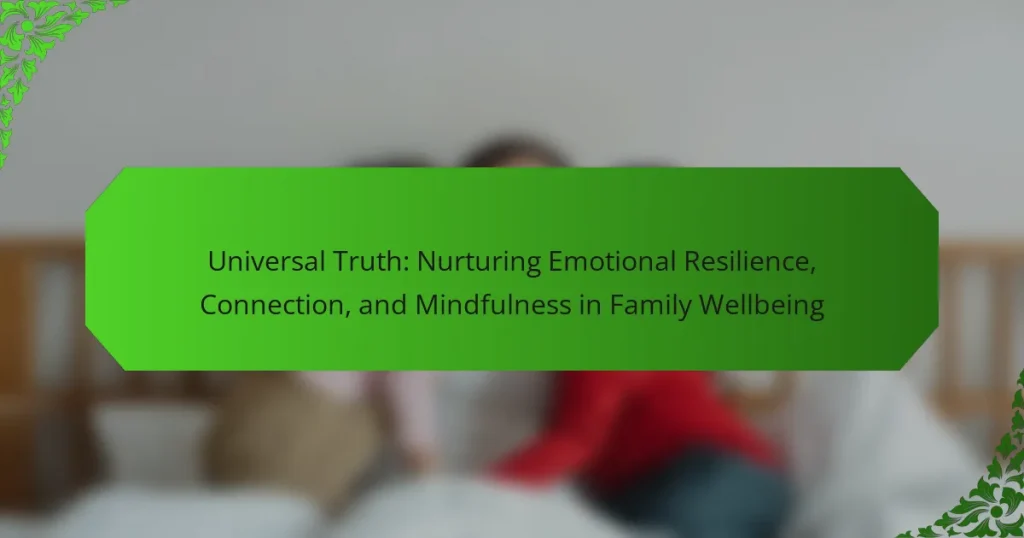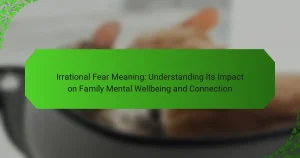Emotional resilience is crucial for family wellbeing, enabling families to effectively cope with challenges. This article explores the importance of connection in fostering emotional resilience, the role of mindfulness practices like meditation and gratitude journaling, and effective strategies for nurturing a supportive family environment. By prioritising these elements, families can enhance communication, reduce stress, and strengthen their bonds.
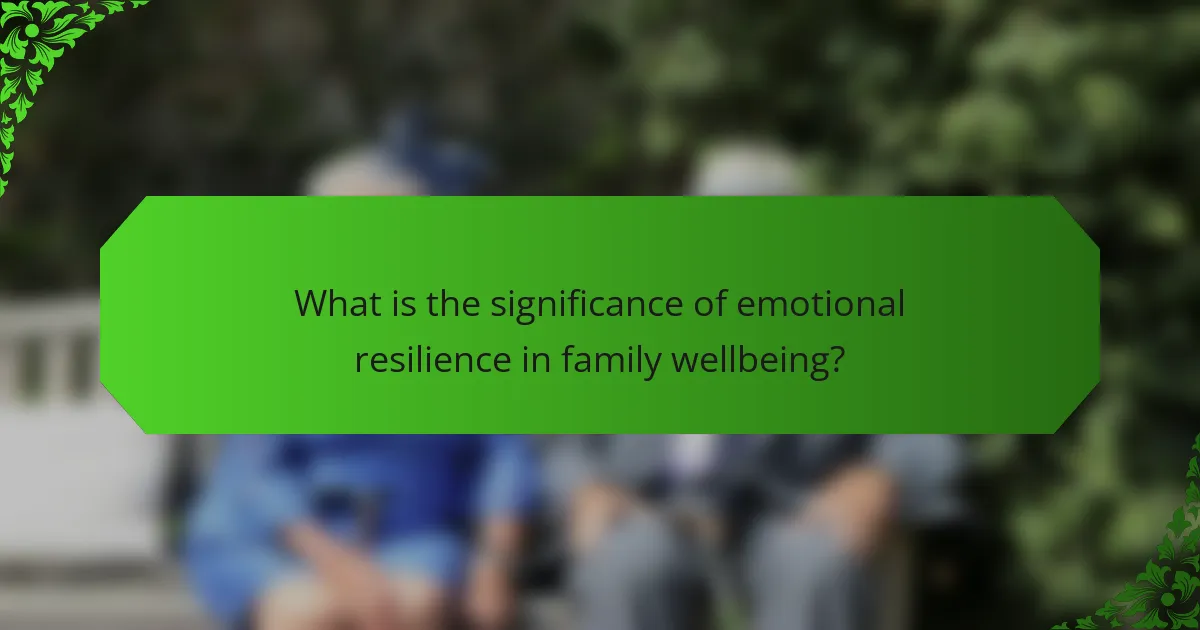
What is the significance of emotional resilience in family wellbeing?
Emotional resilience significantly enhances family wellbeing by fostering strong connections and effective coping strategies. Families with high emotional resilience can navigate challenges together, improving communication and reducing stress. Research shows that resilient families exhibit greater overall satisfaction and stability. By nurturing emotional resilience, families can create a supportive environment that promotes mindfulness and connection, ultimately leading to healthier relationships and improved mental health outcomes.
How does emotional resilience impact family dynamics?
Emotional resilience significantly enhances family dynamics by fostering effective communication and conflict resolution. Families with high emotional resilience adapt better to stress, leading to stronger connections. This resilience encourages empathy and understanding, reducing misunderstandings. As a result, family members support each other during challenging times, promoting overall wellbeing. Studies indicate that emotionally resilient families experience lower levels of anxiety and depression, contributing to a healthier family environment.
What are the key components of emotional resilience?
Emotional resilience comprises several key components that enhance well-being. These include self-awareness, the ability to manage emotions, problem-solving skills, and social support. Self-awareness allows individuals to recognise their feelings and reactions, fostering emotional regulation. Managing emotions effectively helps navigate stress and adversity. Problem-solving skills enable constructive responses to challenges, while social support provides a network for sharing experiences and coping strategies. Together, these components fortify emotional resilience, promoting a healthier family dynamic.
How can families cultivate emotional resilience together?
Families can cultivate emotional resilience together by engaging in open communication, practising mindfulness, and supporting each other through challenges. Regular family meetings foster connection and understanding. Incorporating mindfulness activities, such as meditation or nature walks, enhances emotional awareness. Establishing routines that prioritise emotional check-ins promotes a supportive environment. Engaging in shared experiences strengthens bonds and builds resilience collectively.
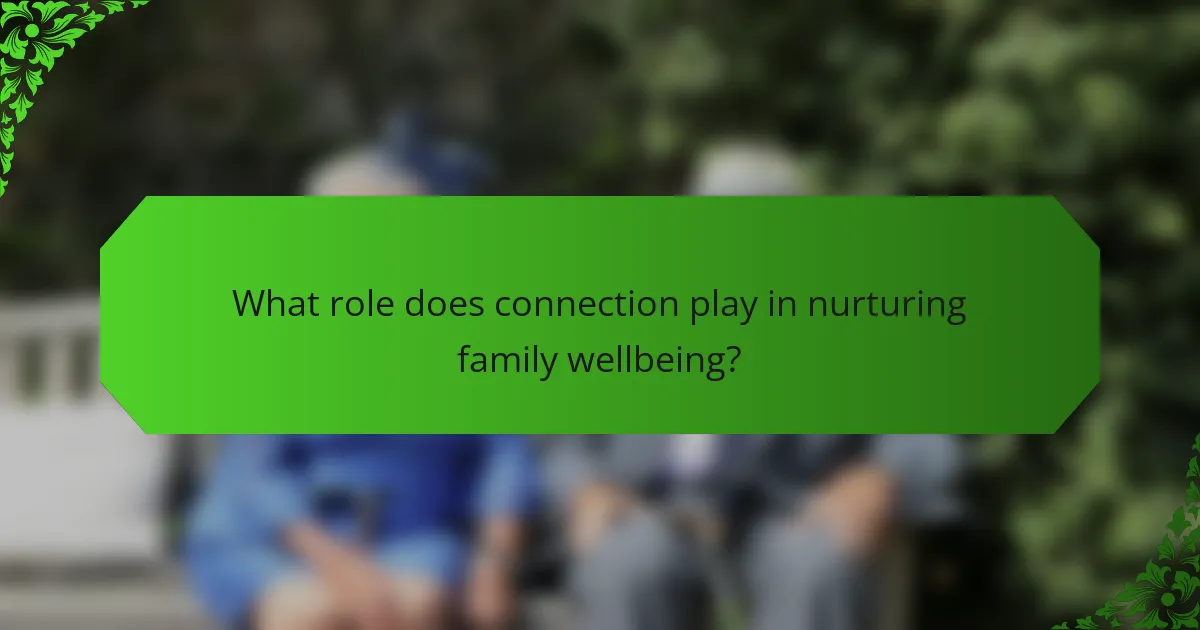
What role does connection play in nurturing family wellbeing?
Connection is essential for nurturing family wellbeing as it fosters emotional resilience and mindfulness. Strong familial bonds create a supportive environment, enabling members to cope with stress and challenges. Research indicates that families with high connection levels experience improved mental health outcomes. Furthermore, regular family interactions enhance communication skills and reinforce shared values, contributing to a cohesive family unit. Prioritising connection can lead to long-term benefits, such as increased happiness and reduced anxiety among family members.
Why is connection essential for mental health in families?
Connection is essential for mental health in families because it fosters emotional resilience and stability. Strong relationships within a family provide support during challenging times, enhancing individual coping mechanisms. Research indicates that families with open communication experience lower levels of anxiety and depression. Furthermore, nurturing emotional connections promotes mindfulness, which contributes to overall family wellbeing. Engaging in shared activities strengthens bonds and creates a sense of belonging, crucial for positive mental health outcomes.
What are effective ways to strengthen family connections?
Effective ways to strengthen family connections include open communication, shared activities, and emotional support. Prioritising quality time fosters deeper bonds. Families can engage in regular family meetings to discuss feelings and concerns, enhancing emotional resilience. Practising mindfulness together, such as through meditation or nature walks, promotes connection and well-being. Additionally, celebrating achievements and expressing gratitude reinforces positive interactions.
How can shared activities enhance family bonds?
Shared activities strengthen family bonds by fostering emotional resilience, connection, and mindfulness. Engaging in joint experiences promotes communication and understanding among family members. Research indicates that families who participate in shared activities report higher levels of satisfaction and emotional health. For instance, family game nights or outdoor adventures create lasting memories and reinforce relationships. These activities can enhance problem-solving skills and empathy, contributing to overall family wellbeing.
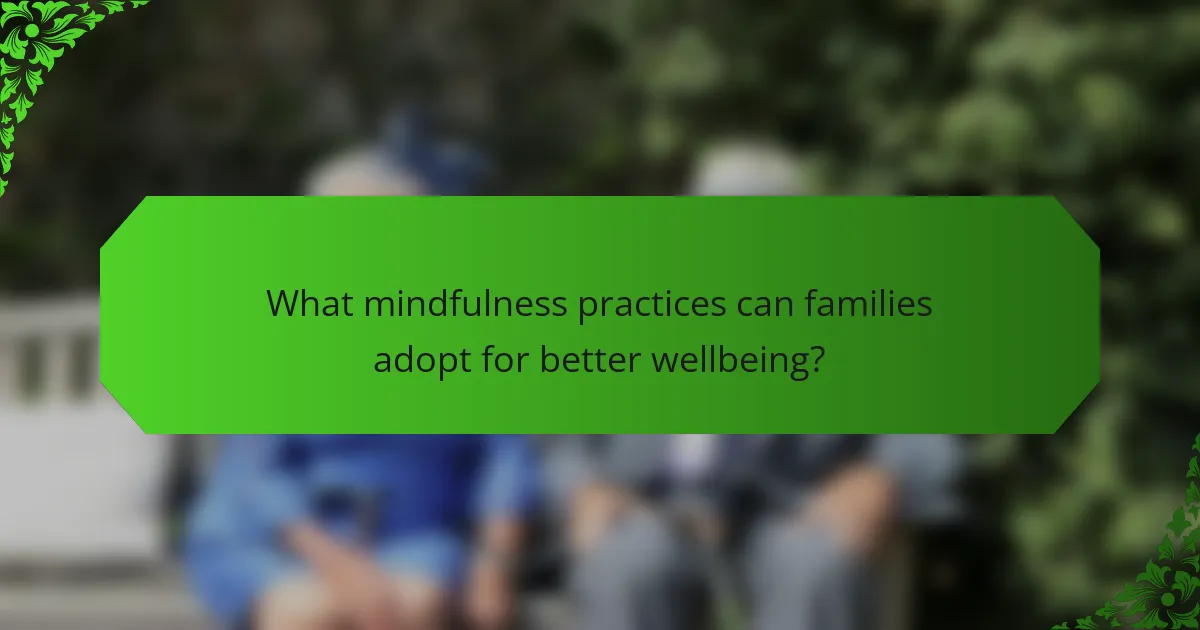
What mindfulness practices can families adopt for better wellbeing?
Families can adopt mindfulness practices such as meditation, breathing exercises, and gratitude journaling for better wellbeing. These practices enhance emotional resilience and strengthen family connections.
Meditation fosters a calm environment, allowing family members to connect with their emotions. Research shows that regular meditation can reduce stress levels and improve overall mental health.
Breathing exercises, like deep belly breathing, can be practised together. This technique helps regulate emotions and promotes relaxation during stressful moments, creating a supportive family atmosphere.
Gratitude journaling encourages family members to express appreciation for each other. This practice can enhance positive interactions and strengthen bonds, contributing to a nurturing home environment.
How does mindfulness contribute to emotional stability?
Mindfulness significantly enhances emotional stability by fostering awareness and acceptance of feelings. It encourages individuals to observe their emotions without judgment, leading to better emotional regulation. Research indicates that mindfulness practices can reduce anxiety and depression, promoting resilience in stressful situations. This unique attribute of mindfulness empowers families to cultivate a supportive environment, enhancing overall wellbeing and connection.
What are simple mindfulness exercises suitable for families?
Mindfulness exercises for families include deep breathing, mindful walking, gratitude journaling, and body scans. These activities foster emotional resilience, strengthen connections, and enhance overall family wellbeing.
1. Deep Breathing: Sit together and take slow, deep breaths, focusing on inhaling and exhaling.
2. Mindful Walking: Walk in nature, paying attention to the sights, sounds, and sensations.
3. Gratitude Journaling: Encourage each family member to write down three things they are grateful for daily.
4. Body Scans: Lie down and mentally check in with each body part, promoting relaxation and awareness.
How can families incorporate mindfulness into daily routines?
Families can incorporate mindfulness into daily routines by dedicating specific times for practice. Start with short sessions of mindful breathing, encouraging everyone to focus on their breath. Create a family gratitude ritual, sharing three things each member appreciates daily. Engage in mindful eating by savouring meals together without distractions. Use nature walks to foster awareness of surroundings, promoting connection and presence. These practices nurture emotional resilience and strengthen family bonds.
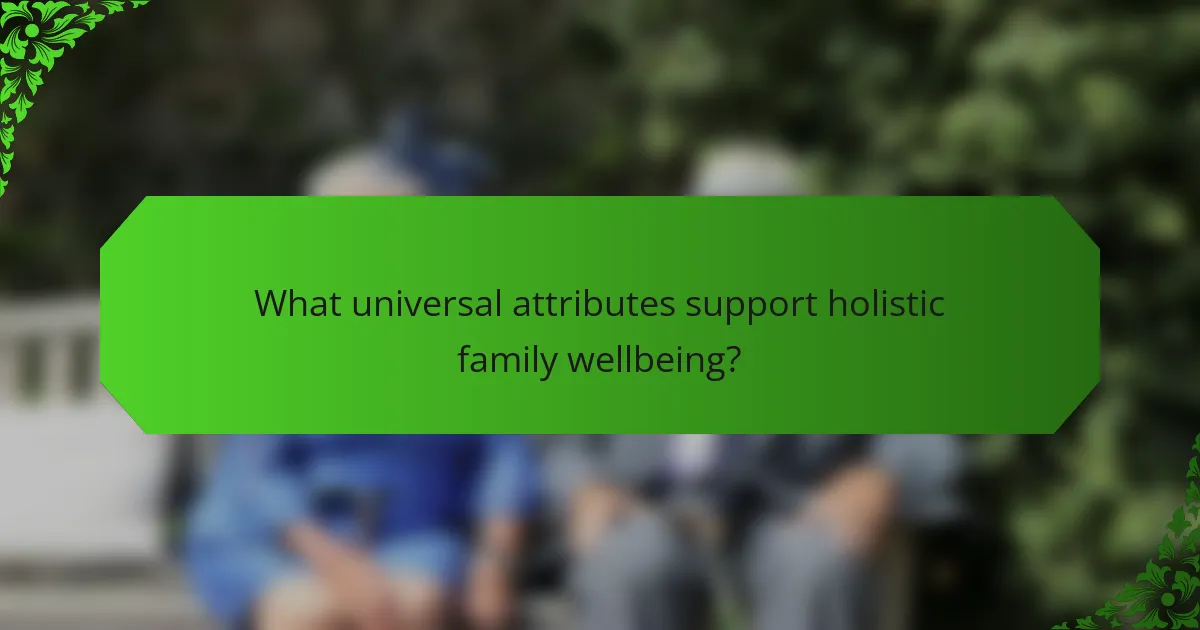
What universal attributes support holistic family wellbeing?
Emotional resilience, connection, and mindfulness are universal attributes essential for holistic family wellbeing. These attributes foster a supportive environment, enhance communication, and encourage coping strategies. Emotional resilience enables families to navigate challenges effectively. Connection strengthens relationships, creating a sense of belonging. Mindfulness promotes awareness and presence, reducing stress and enhancing overall family dynamics. Together, these elements cultivate a nurturing atmosphere that supports growth and harmony within families.
How does open communication foster emotional resilience?
Open communication enhances emotional resilience by fostering trust, understanding, and connection within families. When family members express their feelings openly, they create a safe environment where individuals feel valued and heard. This practice helps build strong emotional bonds, allowing members to navigate challenges together. As a result, families can effectively manage stress and adapt to change, promoting overall wellbeing.
What are the benefits of establishing family rituals?
Establishing family rituals fosters emotional resilience, strengthens connections, and enhances mindfulness. These practices create a sense of belonging and stability. Research indicates that families with regular rituals experience improved communication and emotional support. Unique attributes of these rituals include enhancing shared memories and promoting a positive family identity. As a result, family members develop greater emotional intelligence and coping skills.
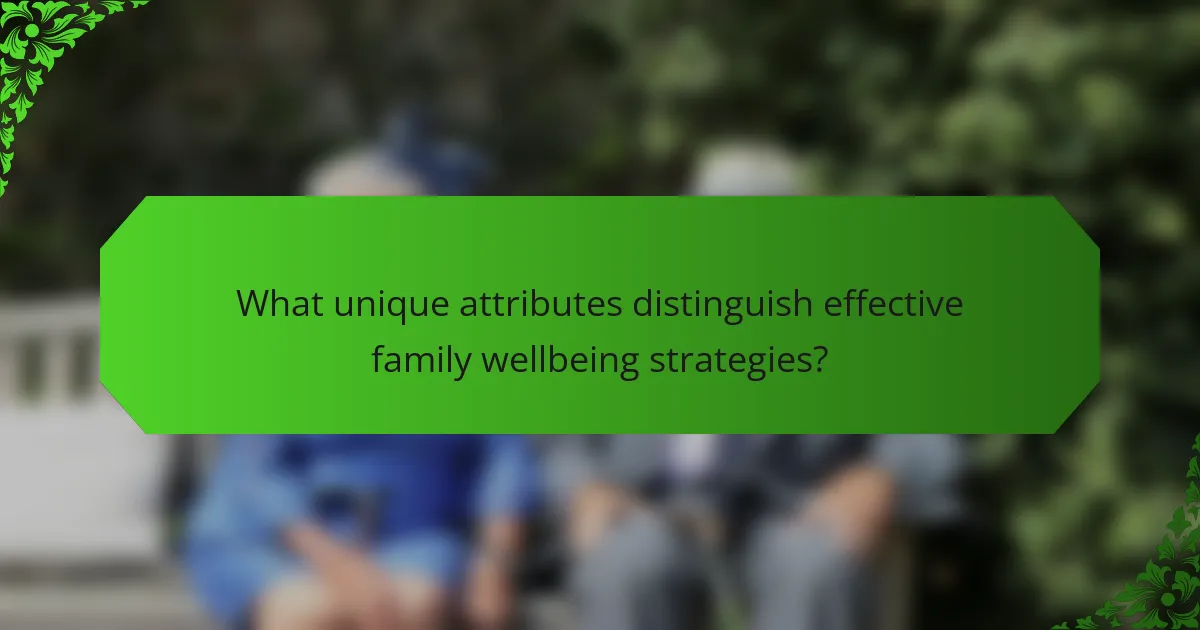
What unique attributes distinguish effective family wellbeing strategies?
Effective family wellbeing strategies are distinguished by their focus on emotional resilience, connection, and mindfulness. These strategies promote open communication, foster supportive relationships, and encourage self-awareness. Unique attributes include tailored approaches that address individual family dynamics, integration of mindfulness practices into daily routines, and the emphasis on building emotional intelligence. As a result, families develop stronger bonds and better cope with challenges, enhancing overall wellbeing.
How does cultural background influence family wellbeing practices?
Cultural background significantly shapes family wellbeing practices by influencing emotional resilience, connection, and mindfulness. Families from collectivist cultures often prioritise communal support, fostering strong emotional ties. In contrast, individualistic cultures may emphasise personal development, impacting mindfulness practices. Diverse cultural rituals and traditions also enhance family connections, promoting a sense of belonging and shared identity. Understanding these differences helps in tailoring wellbeing strategies that resonate with specific cultural values, ultimately improving family dynamics.
What innovative approaches enhance emotional connection?
Innovative approaches that enhance emotional connection include fostering open communication, practising active listening, and engaging in shared experiences. These strategies build trust and understanding, which are essential for emotional resilience in family dynamics. For example, regular family meetings can create a safe space for expressing feelings, while collaborative activities strengthen bonds. Mindfulness practices, like meditation, can also help family members stay present and connected, enhancing overall wellbeing.
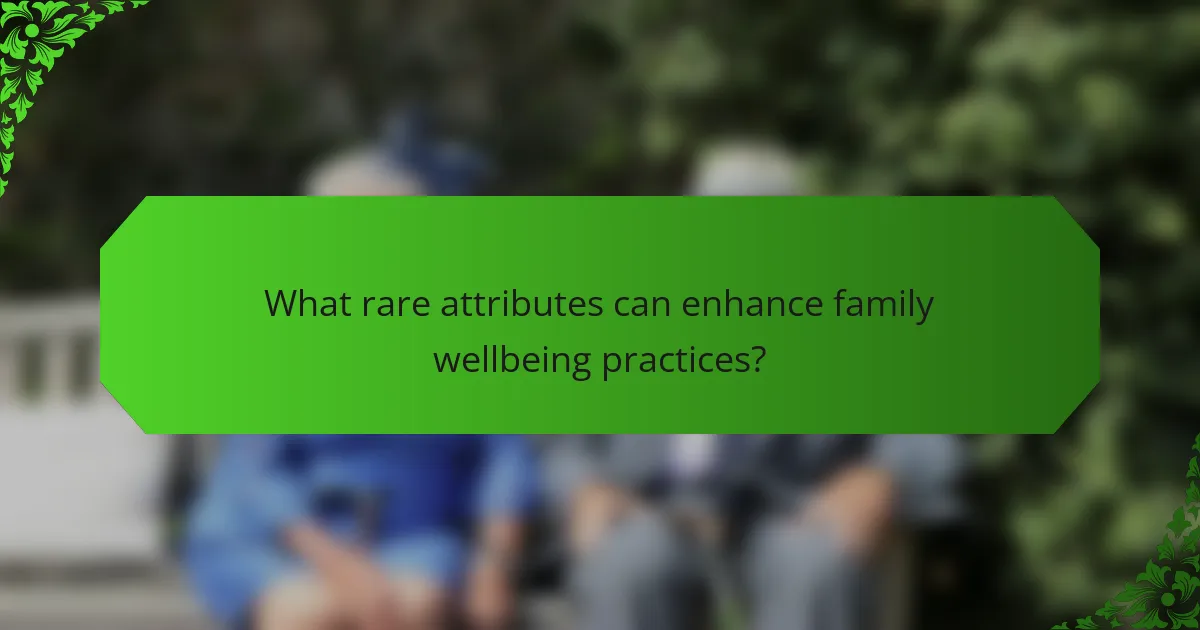
What rare attributes can enhance family wellbeing practices?
Nurturing family wellbeing can be enhanced by incorporating rare attributes like shared storytelling, nature immersion, and gratitude rituals. These practices foster emotional resilience and strengthen family connections. Shared storytelling enhances empathy and communication, while nature immersion reduces stress and promotes mindfulness. Gratitude rituals cultivate appreciation and positivity, creating a supportive family environment.
How can art and creativity be integrated into family wellbeing?
Integrating art and creativity into family wellbeing fosters emotional resilience, connection, and mindfulness. Engaging in creative activities enhances communication and strengthens bonds among family members.
Artistic expression allows families to explore emotions and experiences collectively, promoting understanding and empathy. For instance, collaborative projects like painting or crafting can serve as a platform for sharing thoughts and feelings. This shared creativity nurtures a safe space for emotional expression.
Moreover, creativity encourages mindfulness by focusing attention on the present moment. Activities such as drawing or music-making can reduce stress and anxiety, enhancing overall family wellbeing. Regular creative practices can build lasting habits that support mental health.
Incorporating art into family routines can also provide unique opportunities for learning and growth. Families can discover new skills together, fostering a sense of accomplishment and unity. This shared journey through creativity ultimately contributes to a healthier family dynamic.
What role does nature play in supporting family mental health?
Nature plays a crucial role in enhancing family mental health by fostering emotional resilience, connection, and mindfulness. Engaging with natural environments reduces stress and promotes well-being. Research indicates that families who spend time outdoors experience improved mood and strengthened bonds. Nature provides a unique attribute of tranquility, which facilitates open communication and emotional support among family members. Incorporating regular outdoor activities can lead to lasting mental health benefits for the entire family.
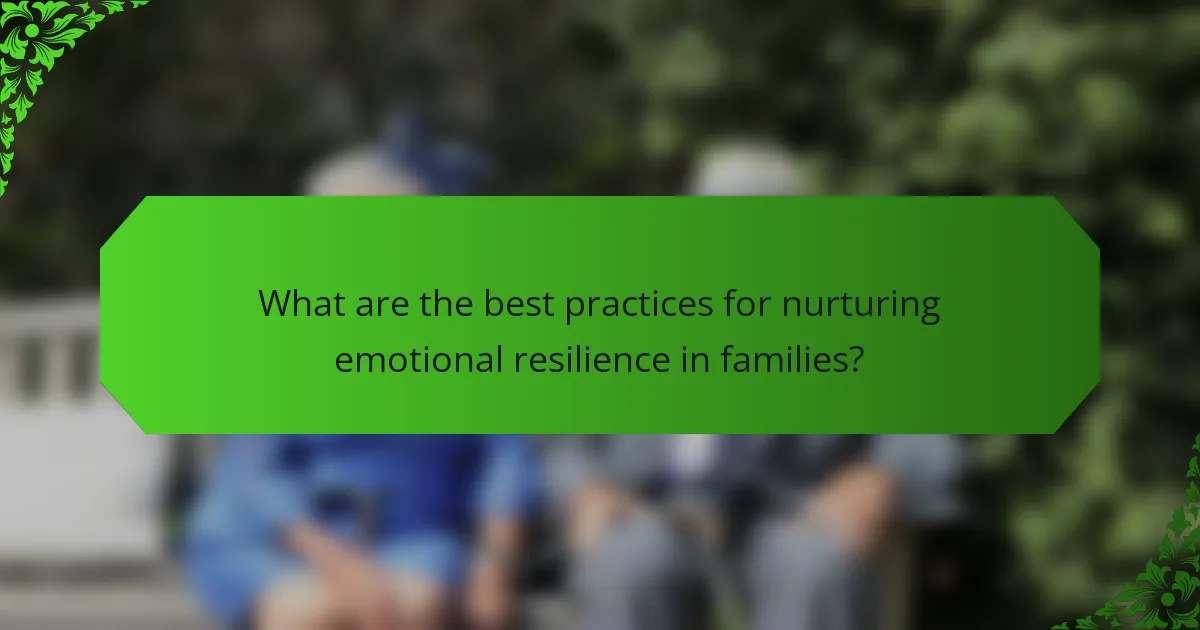
What are the best practices for nurturing emotional resilience in families?
To nurture emotional resilience in families, prioritise open communication, establish routines, and practise mindfulness. These practices foster a supportive environment, enhancing emotional strength.
Encourage regular family discussions to share feelings and experiences. This builds trust and understanding. Implement consistent daily routines to provide stability, helping family members feel secure. Mindfulness activities, such as meditation or yoga, can improve emotional regulation and reduce stress.
Incorporate these strategies into family life to create a resilient unit that can navigate challenges effectively.
What common mistakes should families avoid in their wellbeing journey?
Families should avoid neglecting open communication, failing to prioritise self-care, and dismissing emotional needs. These mistakes hinder emotional resilience and connection. Open dialogue fosters understanding and trust. Prioritising self-care enhances mindfulness and well-being. Acknowledging emotional needs strengthens family bonds. Each of these aspects is crucial for a successful wellbeing journey.
How can families measure their emotional resilience progress?
Families can measure their emotional resilience progress by tracking specific indicators over time. Key metrics include communication effectiveness, conflict resolution skills, and emotional expression frequency. Regular family check-ins can help assess these areas, fostering a culture of openness.
1. **Communication Effectiveness**: Evaluate how well family members share feelings and thoughts.
2. **Conflict Resolution Skills**: Monitor the ability to resolve disagreements constructively.
3. **Emotional Expression Frequency**: Track how often family members express emotions positively.
4. **Mindfulness Practices**: Assess participation in mindfulness activities as a family.
5. **Support Systems**: Consider the strength of external support networks.
By focusing on these attributes, families can gain insights into their emotional resilience journey.
What expert insights can guide families towards holistic wellbeing?
To guide families towards holistic wellbeing, focus on nurturing emotional resilience, fostering connection, and practising mindfulness. Emotional resilience equips families to navigate challenges effectively, enhancing overall wellbeing. Connection strengthens familial bonds, promoting a supportive environment. Mindfulness cultivates awareness and presence, reducing stress and improving mental health. These expert insights collectively contribute to a healthier family dynamic and individual growth.
